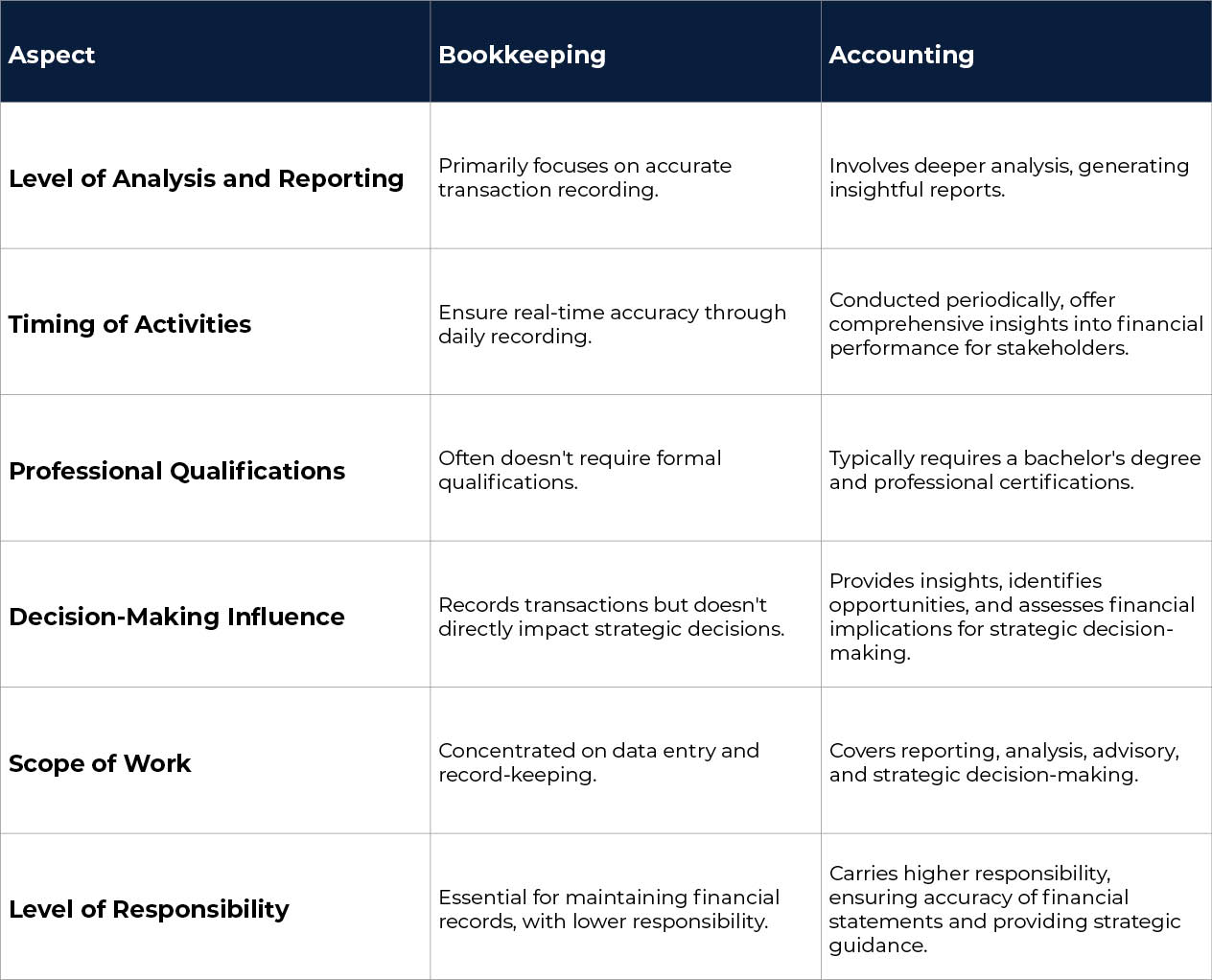In the world of finance and business, the terms “bookkeeping” and “accounting” are often used interchangeably, leading to confusion about their respective roles and responsibilities. While both are important for financial management, they focus on different aspects and require distinct skill sets. Let’s break down the key differences between bookkeeping and accounting to allow you to make informed financial choices and guarantee adherence to regulations.

What Is Bookkeeping?
It is the foundation of financial record-keeping. Bookkeepers play an important part in a company’s financial stability. They serve as thorough recordkeepers, keeping track of all financial transactions such as sales revenue, purchases, payroll, and costs. Their primary responsibility is to maintain the accuracy and timeliness of financial records by making sure each transaction is appropriately categorised and documented.
Bookkeeping Responsibilities
Bookkeepers are responsible for quite a few things namely:
- Recording Financial Transactions: They chronicle all business transactions, including sales, purchases, payments, receipts, and other monetary exchanges.
- Maintaining Ledgers and Journals: Ledgers and journals serve as a comprehensive archive of a company’s financial activities.
- Tracking Accounts Payable and Receivable: They keep proper track of invoices, timely payments, and outstanding balances.
- Reconciling Bank Statements: They cross-reference transactions with bank records to identify and resolve discrepancies, maintaining financial records integrity.
- Processing Payroll: They calculate employee wages, deduct taxes, and issue paychecks or facilitate direct deposits, crucial for labour laws compliance and employee relationships.
Tools and Techniques
To be successful, bookkeepers use various tools and techniques, such as:
- Double-Entry Bookkeeping: This guarantees every transaction has two sides: a debit and a credit of equal value. This maintains the accounting equation (Assets = Liabilities + Equity) for accurate financial reporting and provides a clear view of your business’s financial health.
- Ledger Maintenance: They maintain general and subsidiary ledgers, ensuring the accuracy of all transactions.
- Chart of Accounts: A list of all accounts used by an organisation, to classify financial transactions and maintain consistency in reporting.
Skills Required
Successful bookkeepers have a wide range of skills, including:
- Attention to Detail: Essential for accurate financial records.
- Proficiency with Accounting Software: Streamlines tasks and improves efficiency.
- Understanding Basic Accounting Principles: Essential for effective duties.

What Is Accounting?
Accounting is the art of financial analysis and guidance. Accountants interpret and analyse the financial data thoroughly recorded by bookkeepers. They extract valuable insights and translate them into actionable guidance. This empowers businesses to make informed decisions across various aspects of their operation.
Accounting Responsibilities
Accountants are responsible for quite a few things namely:
- Preparing Financial Statements: Compiling and preparing financial statements like income, balance sheets, and cash flow statements.
- Analysing Financial Data: Identifying trends and potential issues, and providing improvement recommendations.
- Providing Financial Advice: Offering insights into budgeting, forecasting, investment strategies, and risk management.
- Ensuring Compliance: Ensuring financial practices and reporting adhere to GAAP, industry-specific regulations, and relevant laws.
- Tax Preparation: Assisting businesses in tax planning, identifying tax savings opportunities, and ensuring accurate and timely tax returns.
Tools and Techniques
To perform their duties effectively, accountants have a variety of tools and techniques, including:
- Financial Ratio Analysis: They use ratios to assess a company’s financial health, like profitability, liquidity, and solvency.
- Budgeting and Forecasting: They develop budgets and financial forecasts to help organisations plan and allocate resources effectively and make informed financial decisions
- Auditing: They assess internal controls and verify financial statements for accuracy, preventing fraud and misstatements.
Skills Required
Successful accountants have a wide range of skills, including:
- Strong analytical skills for interpreting financial data.
- Knowledge of financial regulations like GAAP and IFRS.
- Effective communication of financial information to stakeholders.
Let’s Take A Closer Look At The Difference Between Bookkeeping And Accounting
While bookkeeping and accounting are interconnected, there are several key differences that set them apart:

Why Both Bookkeeping and Accounting Are Important
Bookkeeping and accounting, while independent functions, are tightly linked and form the foundation of a company’s financial health. Bookkeeping acts as the foundation by precisely recording and categorising financial transactions. This ensures the veracity of the data that accountants use to compile credible financial accounts and smart analysis.
A strong foundation in bookkeeping is necessary for accountants to generate reports that have any value. Accounting, on the other hand, brings bookkeeping’s basic facts to life. Accountants interpret this information, turning it into useful insights and strategic recommendations. They advise firms on crucial financial decisions, tax planning, and compliance, adding incredible value to the data gathered by bookkeepers.
In essence, bookkeeping and accounting work in perfect unison. By working together, they guarantee the financial health and success of an organisation. Neglecting either discipline can result in poor decision-making, noncompliance with regulations, and, eventually, financial instability.
When to Hire a Bookkeeper vs. Accountant
The decision of whether to hire a bookkeeper or an accountant depends on several factors:
- Size and Complexity of the Business: Smaller businesses with straightforward financial operations might find bookkeeping software sufficient for their needs. However, as a business grows and financial transactions become more intricate, the expertise of a bookkeeper becomes invaluable. For larger businesses with complex financial structures, regulations, and tax considerations, an accountant becomes essential.
- Financial Needs and Goals: Businesses with specific financial goals, such as securing funding or expanding into new markets, require a deeper understanding of their financial health. An accountant’s analytical skills and strategic counsel can prove crucial in achieving these goals.
- In-house Expertise: Some businesses may have employees with bookkeeping skills who can handle basic record-keeping tasks. However, relying solely on internal resources might not be sustainable or effective in the long run. Hiring a professional bookkeeper or accountant ensures expertise, objectivity, and adherence to best practices.
Additional Considerations of Bookkeeping vs Accounting
The fields of bookkeeping and accounting involve more than just recording and analysing statistics. Here are some additional aspects to consider:
- Technology and Automation: Accounting software has revolutionised bookkeeping and accounting practices. Cloud-based solutions streamline data entry, automate tasks, and facilitate collaboration. Both bookkeepers and accountants leverage technology to enhance efficiency and accuracy.
- Specialisation: Within accounting, various specialisations exist, such as tax accounting, forensic accounting, and audit accounting. Businesses with specific needs might seek an accountant with expertise in a particular area.
- Ethical Considerations: Both bookkeepers and accountants adhere to a strict code of ethics. This includes maintaining confidentiality, avoiding conflicts of interest, and ensuring the accuracy and integrity of financial records.
Whether you’re a small business owner or a large corporation, investing in robust bookkeeping services and accounting practices is essential. Bookkeeping and accounting are closely related but play distinct roles in an organisation’s financial management framework. DASA Accountancy can help you to handle financial management complexity with confidence.
FAQs
What is the biggest difference between bookkeeping and accounting?
Bookkeeping involves recording and organising financial transactions, while accounting involves interpreting data, generating statements, and analysing performance.
Can the roles of bookkeeper and accountant be performed by the same person?
Yes, in smaller organisations, one person may handle both. However, in larger firms, these roles are typically separate due to the complexity and specialisation of each function.
How do bookkeeping and accounting contribute to the financial health of a business?
They are essential tools for maintaining accurate financial records and providing valuable insights for businesses to make informed decisions for sustainable growth.
What are the educational requirements for bookkeeping vs accounting?
Bookkeeping typically requires basic accounting knowledge, while accounting often requires higher education and professional certifications like CPA or CA for expertise and proficiency.




